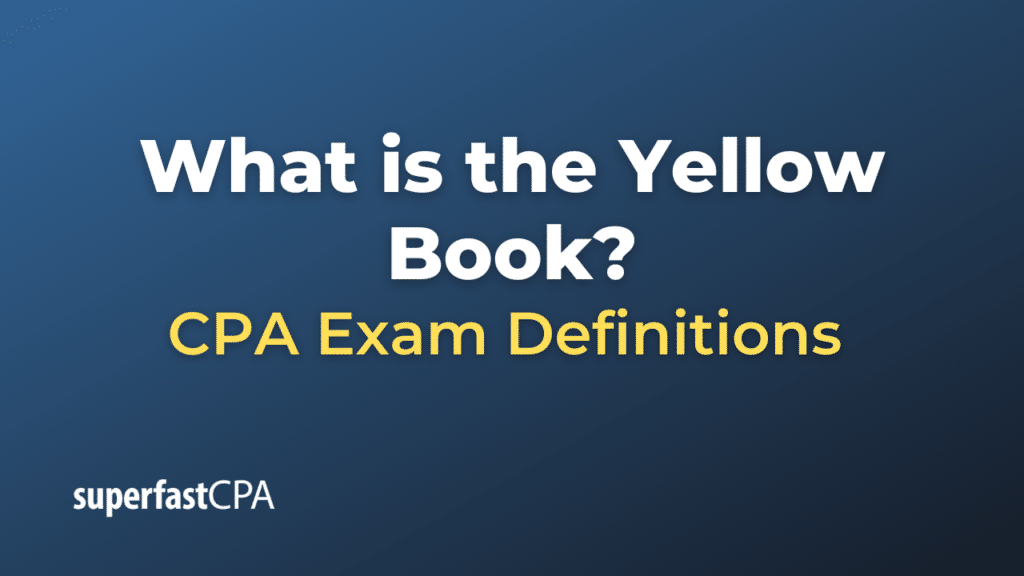Yellow Book
The term “Yellow Book” in the context of accounting refers to the “Government Auditing Standards” issued by the Comptroller General of the United States in the Government Accountability Office (GAO). These standards are used for conducting audits of government organizations, programs, activities, and functions, as well as of government assistance received by contractors, nonprofit organizations, and other non-government organizations. The Yellow Book provides guidelines for auditors on various aspects such as independence, professional judgment, competence, quality control, and the types of services that can be provided.
The Yellow Book aims to provide a framework for high-quality government audits, which include financial audits, performance audits, and attestation engagements. These standards are designed to ensure that government audits are conducted in a consistent and high-quality manner, thereby improving the accountability and effectiveness of government operations.
The name “Yellow Book” comes from the color of the book’s cover, which is traditionally yellow. It is a widely recognized guide and is used both within the United States and internationally for those involved in governmental auditing.
Why It’s Important:
- Enhances Credibility: The use of Yellow Book standards can add credibility to an audit engagement, as it signals that the audit was conducted based on rigorous, government-approved standards.
- Public Accountability: Given that taxpayers and other stakeholders require assurance on how public funds are used, the Yellow Book standards serve as a mechanism to ensure that audits are performed to a standard that supports public accountability.
- Uniformity: The Yellow Book provides a uniform set of guidelines that auditors can refer to, which is particularly important when multiple jurisdictions are involved, or when public and private entities jointly participate in government programs.
- Compliance: Compliance with Yellow Book standards is often a requirement for auditors when auditing federal, state, or local government programs and may be mandated by law or regulation.
Overall, the Yellow Book serves as a comprehensive guide for auditors involved in the governmental audit sector, ensuring that the audits are performed efficiently, effectively, and with the highest degree of professional integrity.
Example of the Yellow Book
Let’s consider a hypothetical example to illustrate how the Yellow Book might be used in a real-world scenario involving a government audit.
Suppose the City Council of “Greenwood City” has decided to have an external audit conducted on the city’s Department of Public Works. This department has been allocated a budget of $10 million for the fiscal year to handle road repairs, garbage collection, water supply, and other public services. However, several residents have filed complaints about inefficient services and budget overruns.
The City Council decides to hire “StateView Auditors,” an accounting firm specialized in governmental audits, to carry out the investigation. Since public funds are involved, and accountability to taxpayers is a priority, the firm must adhere to the Yellow Book’s Government Auditing Standards.
Audit Steps Following Yellow Book Guidelines
- Planning: StateView Auditors begin by planning the audit, considering the risk factors, objectives, and scope. The Yellow Book provides guidance on what factors to consider and how to define the scope.
- Independence and Ethics: The auditors ensure that they have no conflicts of interest with the Department of Public Works or any of its contractors. They also review ethical requirements as laid out in the Yellow Book.
- Evidence Gathering: StateView Auditors conduct site visits, interviews, and reviews of financial records to gather evidence. The Yellow Book specifies the types of evidence considered sufficient and appropriate.
- Testing and Procedures: The auditors test a sample of transactions related to road repairs and garbage collection to determine if funds were utilized efficiently. They follow the Yellow Book guidelines on statistical sampling and data reliability.
- Findings and Recommendations: After completing the audit, StateView Auditors prepare a report that outlines their findings. They discover that $1 million was overspent due to inefficiencies and lack of competitive bidding for contracts. They provide recommendations for improvements, following the Yellow Book’s framework on how to present findings and recommendations.
- Report Submission: The audit report is submitted to the City Council, and because it adheres to the Yellow Book standards, it carries a higher level of credibility and is viewed as more reliable.
- Public Disclosure: Since the audit was conducted according to Yellow Book standards, the City Council decides to make the audit findings public to show accountability and transparency.
- Follow-up: The Yellow Book also provides guidance on follow-up procedures to ensure that the recommendations are implemented. StateView Auditors might be engaged again to perform a follow-up audit after a year.
Benefits
- Enhanced Credibility: Because StateView Auditors followed the Yellow Book standards, their findings carry weight and help enhance public trust.
- Accountability: The Department of Public Works is held accountable for the inefficient use of funds, leading to actions for improvement.
- Transparency: The public disclosure of the audit findings increases transparency and informs taxpayers about how their money is being spent.
By adhering to the Yellow Book standards, StateView Auditors have provided a thorough and reliable audit that can serve as a basis for improving public services and governance in Greenwood City.













